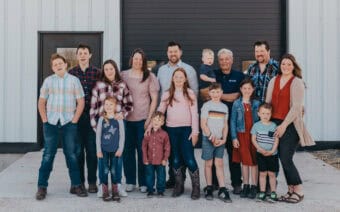
August 23, 2023
BRILLION – Wisconsin boasts many family farms, but multi-generational farms are something special.
So special, in fact, that the Wisconsin State Fair has been officially honoring multi-generational Wisconsin farms since the Century Farms program was created in 1948.
One of them is right here in Northeast Wisconsin.
Woldt Farms, LLC – owned today by Daryl and Amy Woldt – was started in 1911 by Daryl’s great-grandfather, Herman Woldt.
The farm has a long Woldt family lineage.
Daryl’s grandfather worked on the farm as a boy and eventually took it over from Herman.
Daryl’s father, Hugo, also worked on the farm as a young boy and eventually became heir to the operation.
Likewise, Daryl worked on the family farm as a young boy, and he and Amy took it over from his parents in 1990.
Making sure the farm was poised for growth, Daryl said Woldt Farms became Woldt Farms, LLC in 1998.
Decades of growth key to success
Daryl said he isn’t sure how large the family farm was in previous generations, but he does remember his father milking 32 cows.
When he and Amy took over the farm, the herd had been expanded to between 60 and 80 dairy cows.
And, back then, he said, it was strictly a dairy and crop farm – which included corn, alfalfa and on a smaller scale, some wheat and soybeans.
Daryl said Woldt Farms, LLC underwent its first large expansion of its dairy operation in 2004, adding 300 cows.
Another 400 cows were added to the milking herd in 2008, at which time a larger milking parlor and free stall barn were also added.
Eight years later in 2016, the Woldts doubled their milking herd to 1,400 cows, enlarged its milking parlor and added a large free stall.
The following year, Daryl said, a commodity shed was added.
Today, some 33 years after they took over the farm, Daryl said they milk 1,600 cows and have added beef cows to the farm – currently having approximately 200 Angus beef.
Daryl said they still grow and harvest many of the same crops his ancestors did, but added grass – both annual and perennial used to feed their herds – to their list of crops about 15 years ago.
If a farming operation is to remain viable, Daryl said it must grow and expand.
But he said it isn’t just about increasing the crops you grow or the herds of cows you raise – you need more land, too.

The Woldt Farms family, from left Kayla, Kelsey, Amy, Daryl, Karly, Kristen and Kortney. Photo Courtesy of Lindsey Bloom Photo + Video
“If you want to grow your farm and your cattle numbers, you have to have enough land to grow feed for them, and you also have to have land to take the manure to,” he said. “So, you either have to rent it, buy it or you have to work with a neighboring crop farmer or something.”
Given the distinction of being a Century Farm in 2011 – Daryl said they have been fortunate to increase their acreage over the years.
When they first took over the farm, Daryl said it was only about 300 acres, 400 at the most.
Today, he said, it is about 4,500 acres.
“Some of it is contiguous to the original farm,” he said. “But, we’ve also bought or rented land from other farmers as they went out of business (which is spread over approximately 30-35 miles).”
However, Daryl said it is only about 15 miles or so in any given direction, making it easier and cost-effective to get to and maintain the land.
Diversification vital as part of growth
Sometimes in the business world, just expanding what you have doesn’t necessarily equal viability.
In the case of Woldt Farms, LLC, Daryl said diversification of what it does has played a large part in the ongoing success of the farm business.
The Woldts said they grow and store enough feed to not only take care of their own needs but to sell to other farms, as well.
“We raise quite a bit of extra crops we sell to other farmers – especially dairy farmers, to feed their animals,” Daryl said. “We sell corn silage, haylage, ryelage and also offer complete rations (called Total Mixed Rations). We mix everything together into a total mixed ration, then sell that to other farms.”
Over the course of a year, Daryl said they sell to about a dozen or so farms.
“It’s not year-round for every farmer,” he said. “Some may just run short at certain times of the year or need a little bit to get them through. But then some farms buy all their feed from us, so we sell to them all year round.”
Daryl said cows on Woldt Farms are also fed these special rations – a precise mixture that is determined by their nutritionist.
Another diversified aspect of the business, Daryl said, is its custom manure pumping, hauling and application business – something they do a lot of for other farmers.
In addition, he said, they operate a complete line of manure application equipment.
And because they have a lot of trucks, Daryl said Woldt Farms does a lot of trucking of whey (a milk by-product) and other commodities – which are extensions to the original farm business.
In 1998, the same year they became an LLC, the Woldts created two other businesses – W&W Bagging, LLC and Woldt Harvesting, LLC.
W&W Bagging – which Daryl said they formed with neighbor Mark Wittman – is a silage bagging business in which they rent out bagging machines.
“We have a bunch of bagging machines we take to other farms in the area so they can fill the bags with the feed,” he said. “So, we’re renting them the machines. But we also sell the plastic bags and bunker covers for storing feed.”
Daryl said the bags are filled with feed for the cows – which most of the time is haylage or corn silage.
“We used to do some filling of the bags for other farms, but that was mostly when we did more of the (custom forage harvesting),” he said. “We still do some, just not as much. But when we did, we’d go to other farms and harvest their crops for them.”
As the farm grew, Daryl said it was more important to get their own crops harvested and put up at the right time.
“Now, we generally just take the machines to the farms and they fill the bags themselves,” he said.
The family farm store
The most recent addition to the operation is Woldt’s Farm Store, LLC (opening in May 2022), which is housed in a 660-square-foot building that Daryl said was once his father’s workshop.
The store is managed by Kortney Woldt – Daryl and Amy’s youngest daughter (one of five daughters, all of whom work in the farm business).
It sells different cuts of the farm’s beef and a plethora of other local products, including local cheese products, goat milk products, vegetables, fruit, maple syrup, honey, eggs, baked goods, candles, sauce and house plants.

Woldt’s Farm Store, LLC, which carries a variety of farm-to-table products, opened in May 2022. Photo Courtesy of Woldt Farms
Daryl said the store also sells spirits, like bourbon, whiskey, gin and vodka, which are made at Ledgerock Distillery, located on a farm in Fond du Lac.
Amy said they also carry A2 milks from another local dairy farmer – Two Guernsey Girls Creamery in Freedom.
“The milks only have certain proteins in them, and they’re proteins that lactose intolerant people can have,” she said. “(They) even make flavored milks, like chocolate, strawberry and now have huckleberry-flavored milk. They also make some block cheese, such as white cheddar and other flavored cheeses.”
The Woldts said they are happy to sell any products made in Wisconsin, especially if they’re made on a farm – they’re even looking for a pizza supplier.
Is a 5th-generation farm in the Woldt’s future?
Though it technically could be considered a 5th-generation farm now – since Daryl and Amy’s daughters work on the farm with their parents, though only one full-time – it’s unclear whether any of those daughters will eventually take over the farm operations.
The eldest of the Woldt’s daughters, Kelsey – who obtained a degree in agriculture business and dairy science – works on the farm full-time, and is involved in almost every aspect of the day-to-day farming operations.
Daughter Kayla – an interior designer – helps on the farm when needed, and if she is available.
Middle daughter Kristen is a teacher in Kimberly and helps on the farm during the summer months and any other time she might be needed and is able to.
Karly works as a behavior treatment technician, working with autistic children.
And Kortney – obtained a degree in business and soil science – works part-time for the local co-op as a crop scout and part-time on the family farm, managing Woldt’s Farm Store.
Daryl said their daughters’ significant others do some work on the farm as well and have expressed interest in one day taking over the farm.
Time will tell what’s next for Woldt Farms.
Daryl said Woldt Farms, LLC employs 30 full-time employees – not including him and Amy – and 10 seasonal workers who work between spring and fall.
Daryl said he handles much of the hands-on farm work, while Amy does the payroll and bookkeeping.
The Woldts said they haven’t had a big problem finding employees, with a few exceptions.
“The problem is finding more of your skilled workers, like your CDL drivers, your mechanics – people with those kinds of skills,” Amy said.
 Former military dog trainer provides service dogs to veterans
Former military dog trainer provides service dogs to veterans Jeopardy! champ pays it forward
Jeopardy! champ pays it forward






